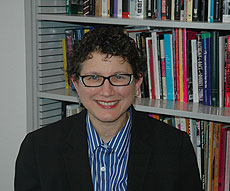SANTA CRUZ, CA--Film scholar B. Ruby Rich will chair a panel discussion at the Sundance Film Festival about how the counterculture has changed since the 1960s.
Rich, an assistant professor of community studies at the University of California, Santa Cruz, and a member of the festival's national advisory board, will chair the panel titled "The Times, Did They A-Change?" on Saturday, Jan. 20, in Park City, Utah.
The panel is linked to a number of festival films that bring up issues relating to American counterculture, including Chicago 10 by filmmaker Brett Morgen, a new documentary about the trial of activists following the 1968 Democratic National Convention.
"Sundance gets media attention for all the hype generated by publicists, but the real heart of the festival has always been panels like this one that take the issues seriously," said Rich, who will be attending her 20th Sundance Festival. "Sundance was the first festival to put documentaries up on the same level as dramatic films, but this is the first time that I can remember that a documentary was chosen for opening night."
In addition to filmmakers Morgen and Julien Temple, others on the panel will be political and cultural commentator Todd Gitlin, investigative satirist Paul Krassner, activist Mike Bonanno of The Yes Men, and film scholar Patricia Zimmermann.
"We have enough distance on the sixties, finally, to see some of its events more clearly," said Rich. "At the same time, this panel will be addressing the differences between then and now, and considering what methods--and technologies--are being employed most effectively by new generations of political activists."
While some might argue that the ideological underpinnings of the 1960s-era counterculture have been eroded, others assert that the ideology is routinely absorbed by the machinery of mass media. Panelists will explore how ideas of counterculture relate to politics, activism, and protest, as well as race, culture, music, and film.
#####



